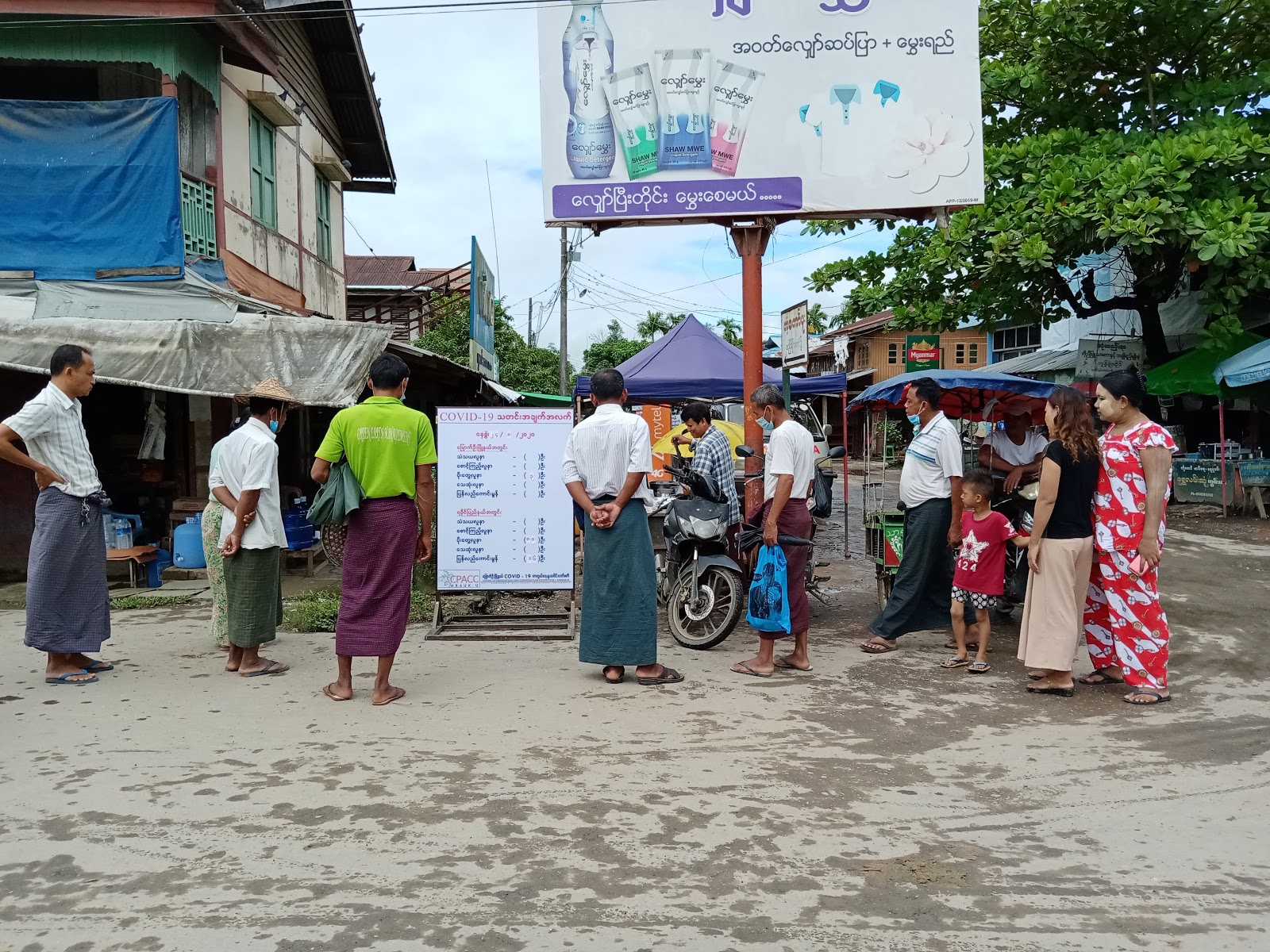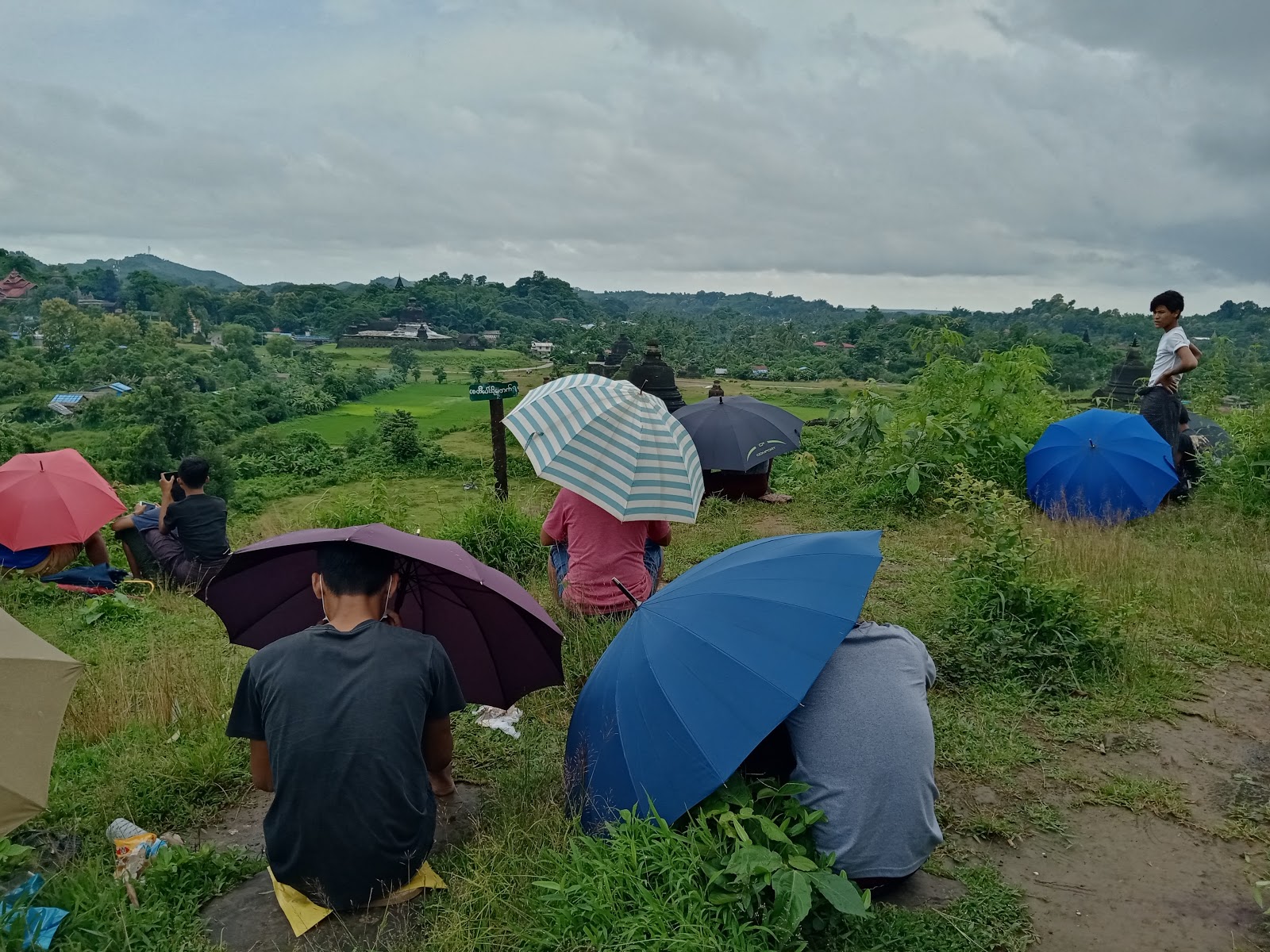This article was supported by the Pulitzer Center
Before a COVID-19 outbreak hit Myanmar’s Rakhine State in mid-August, Thiri Kyaw, whose name has been changed to protect her identity, already had a lot to worry about.
Displaced by civil war between the Myanmar military and the rebel Arakan Army, she has faced uncertainty about her daily survival since fleeing her village in March of last year. On top of this, she now fears what could happen if the coronavirus reaches the displaced person camp where she shares a small room with four of her family members.
“The virus can spread easily to the whole camp if someone gets infected,” she told VICE News.
On August 16, Myanmar announced its first internal COVID-19 transmission in a month in the Rakhine State capital of Sittwe. Since then, the number of cases across the state has swelled to 393 as of September 1. The conflict between Myanmar’s armed forces, or Tatmadaw, and the Arakan Army has only exacerbated challenges to the pandemic response in Rakhine, which is among Myanmar’s least-developed states.
In a report released in March, Human Rights Watch described Myanmar’s displacement camps as “COVID-19 tinderboxes,” and called on the Myanmar government to take urgent steps to reduce the risk of transmission among the estimated 350,000 conflict-displaced persons across the country.
Rakhine, Myanmar’s westernmost state, gained global attention in 2017 when the Tatmadaw conducted a campaign of mass killings, violence and arson against the state’s Rohingya Muslims, which U.N. investigators say was carried out with genocidal intent. More than 730,000 Rohingya have fled to Bangladesh, according to the UNHCR, where they remain in refugee camps.
A further 128,000 Rohingya remain in internally displaced person camps near the Rakhine State capital without freedom of movement since fleeing their homes following sectarian violence in 2012.
Since late 2018, the conflict between the Arakan Army and the Tatmadaw has engulfed Rakhine State, displacing approximately two hundred thousand people, mostly ethnic Rakhine, a predominantly Buddhist population. The Arakan Army, established in 2009, is one of many autonomy-seeking ethnic armed groups across the country, and its primary support base is ethnic Rakhine.
The recent fighting between the Arakan Army and Tatmadaw is some of the fiercest Myanmar has seen in decades, and the conflict’s outcome on civilians is devastating. It includes Tatmadaw airstrikes on villages, disappearance, arrest, torture, burning of property and instances in which the Tatmadaw blocked aid or medical care. The conflict has also spread to neighboring Chin state, where similar abuses have been reported.
In response to the conflict, the government has blocked humanitarian access to rural areas in six of the state’s townships since early 2019, leaving those displaced by conflict largely dependent on assistance from local volunteer groups. Living conditions in displacement camps are cramped—most internally displaced persons (IDPs) live one family to a room in bamboo or tarpaulin shelters or sleep in open halls. Meanwhile, government-imposed internet restrictions have limited access to information for an estimated 1.4 million people.
The coronavirus pandemic has heightened fear in IDP camps in Rakhine
Prior to the civil war, Thiri Kyaw, who is Rakhine, was a rice farmer in her village of Auk Thar Kan. In March 2019, artillery strikes hit the village, killing one and injuring four. Thiri Kyaw fled with her husband and son by foot, and have not returned since.

They now live in Tain Nyo, one of the numerous camps sheltering what are now estimated to be more than 18,000 IDPs across Mrauk-U township. Like many Rakhine IDP camps, Tain Nyo is run by the local community—outside support from NGOs consists of irregular distributions of rice, oil, and salt. The pandemic has further hindered the movement of goods, and in August, not even rice arrived. For basic income, Thiri Kyaw forages for bamboo shoots to sell in the nearest village, and sews clothes.
Thiri Kyaw did not find the security she sought in Tain Nyo camp. In March, gunfire hit the camp and a nearby hospital, killing three, while in June, Tatmadaw soldiers entered the camp searching for Arakan Army members. But with nowhere else to go, Thiri Kyaw has stayed.
“I feel safer here than in my village, but sometimes I feel like I will never be safe as long as I live in Rakhine,” she said.
Phyo Aung, whose name has been changed to protect his identity, is a healthcare worker at a village hospital in Mrauk-U township. He told VICE News that he, too, worries about what could happen if COVID-19 spreads to the township’s IDP camps.
The hospital where he works, which services both IDPs and local villagers, has shut down at times due to the conflict. He said that last year, during a period of heavy fighting, the staff evacuated for a month.
In early August, the hospital’s only doctor resigned, and no one has yet been announced to replace him, according to Phyo Aung. He said internet restrictions add another challenge. In June 2019, the government cut off internet access to nine conflict-affected townships in Rakhine and Chin, later restoring access to one township. Although 2G services were restored in the remaining townships this August, the government continues to block 3G and 4G networks, maintaining that the restrictions are a necessary security measure in the public interest, and at times prosecuting and jailing those who dissent.

Among other consequences of the internet restrictions, Phyo Aung said they have hindered the capacity of the hospital where he works. To send monthly medical reports to his superiors, he must drive eleven miles by motorbike, despite the volatile security situation.
Meanwhile, he said hospital workers lack basic information about the virus spread.
“There were some positive cases [in Mrauk-U township], but we don’t know much about it,” he told VICE News. “We are preparing as best as we can.”
A monk in Mrauk-U township, who goes by the name of the Mra Tazaung Sayadaw (monk) after the monastery where he lives, said that despite limited outside assistance, he is doing his best to protect over 1,000 conflict-displaced persons who stay on his two-acre monastery compound. But taking an active role in the community carries risks, he said, and he fears the Tatmadaw or Arakan Army could mistakenly accuse him of supporting the other side.
“These days, I can’t sleep well,” he told VICE News. “The security situation is getting worse and worse.”
A few shipments of masks and hand sanitizer have reached his monastery, but information about the virus remains scarce, he said. Although the government sends SMS messages with health prevention information, issues converting the Burmese alphabet’s Unicode and Zawgyi fonts make it difficult to decipher the messages, while internet restrictions leave IDPs climbing hills outside the camp to try to get a brief signal.
“As camp leaders, we are raising awareness regarding the virus as much as we can, but we are not professionals, and I doubt if people will understand well,” said the monk.
U Mrat Tun, a man who manages Mra Taung IDP camp in Rakhine State’s Buthidaung township and whose name has been changed to protect his identity, shared similar concerns. With his township also under internet restrictions, he relies on daily phone calls from the Rakhine Ethics Congress, a local civil society organization, for information regarding the pandemic. He then disseminates the updates verbally.
He questioned the accuracy of this approach but said he has not found an alternative.
“When someone calls me, I learn and share the news, but I don’t know if it’s true or not,” he said.
No one in the three camps where VICE News conducted interviews was aware of any COVID-19 testing in their camps, but they are constantly concerned about when the virus may arrive—if it hasn’t yet already.
Thiri Kyaw learned about virus prevention measures when some NGOs visited her camp in March and April. Still, she said her ability to follow daily news updates is limited.
“It takes a long time to get any information,” she said. “I want the war to stop and the internet restrictions to end.”
from VICE US https://ift.tt/35aMaUD
via cheap web hosting
No comments:
Post a Comment